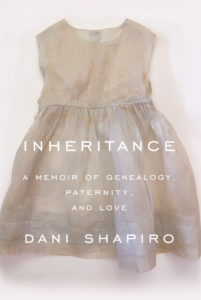A DNA test took author Dani Shapiro’s father away from her. Her reckoning with the emotional aftermath brought him back to her.
By B.K. Jackson
 Author Dani Shapiro has explored family secrets from every angle in an exceptional decades-long writing career that until now yielded five novels and four memoirs. Revisiting those works, it’s tempting to believe everything she’s experienced and written has been prelude to her 10th book, the bestselling “Inheritance: A Memoir of Genealogy, Paternity, and Love.” In an earlier memoir, for example, “Still Writing: The Perils and Pleasures of a Creative Life,” she describes herself in childhood as having been strangely aware unknowns were waiting to be discovered. She didn’t know what she didn’t know, but she was certain there were secrets. Already, she had an untamed curiosity, an urgent need to shed light on those unknowns, and an intuitive understanding of the ways of a writer. She eavesdropped, snooped, and struggled to get to the bottom of things. “I didn’t know that this spying was the beginning of a literary education,” she writes. “That the need to know, to discover, to peel away the surface was a training ground for who and what I would grow up to become.”
Author Dani Shapiro has explored family secrets from every angle in an exceptional decades-long writing career that until now yielded five novels and four memoirs. Revisiting those works, it’s tempting to believe everything she’s experienced and written has been prelude to her 10th book, the bestselling “Inheritance: A Memoir of Genealogy, Paternity, and Love.” In an earlier memoir, for example, “Still Writing: The Perils and Pleasures of a Creative Life,” she describes herself in childhood as having been strangely aware unknowns were waiting to be discovered. She didn’t know what she didn’t know, but she was certain there were secrets. Already, she had an untamed curiosity, an urgent need to shed light on those unknowns, and an intuitive understanding of the ways of a writer. She eavesdropped, snooped, and struggled to get to the bottom of things. “I didn’t know that this spying was the beginning of a literary education,” she writes. “That the need to know, to discover, to peel away the surface was a training ground for who and what I would grow up to become.”
But when she grew up, one thing she never felt a need to get to the bottom of was her story of origin. Despite the blond hair and striking blue eyes that almost daily brought the same comment — “You don’t look Jewish” — she had no doubt about where she came from and who her people were. She took enormous pride in being the progeny of Orthodox Jewish immigrants from Eastern Europe, revered leaders in their communities. “They are the tangled roots — thick, rich, and dark — that bind me to the turning earth.” She was grounded by her Orthodox heritage, its traditions touchstones in her life that tethered her to her father, Paul, whom she adored and whose sadness captivated her. She felt no such tenderness toward her mother, Irene, with whom she had a tenuous relationship. As a child, she says, “I’d had the fantasy — a form of hope, now a staggering irony — that she wasn’t actually my mother.” She told their stories in fiction and in memoir, examining the family as one might a jewel, holding it to the light and observing both its beauty and its flaws.
Although Shapiro had no curiosity about her lineage, when her husband, Michael, who wanted to learn more about his own ancestry, ordered a test for each of them, she went along gamely. But she absorbed its results in stages, in a haze of denial. She was stunned to learn she was only 52% European Jewish and mystified by a match to a first cousin she knew nothing about. Soon after, Michael bounded up the stairs one evening with his laptop in his hands — the rhythm of his steps signaling something urgent — announcing that her half sister Susie, her father’s older daughter, had sent the results of her DNA test, the import of which he’d already gleaned. Shapiro and Susie shared no DNA. This quickly led to the unthinkable yet indisputable conclusion that Shapiro was not the child of the father she adored — the man who died many years earlier after having been in a horrific car crash, whose influence and presence in her life, even now, she cherishes every day.
Readers who’ve experienced similarly staggering DNA surprises can guess exactly what came next — a call to AncestryDNA — because surely there must have been a mistake. The vials must have been switched. But of course they weren’t. As Shapiro acknowledges, “Millions of people have had their DNA tested by Ancestry, and no such mistake has ever been made.” As denial faded, questions bloomed: “If my father wasn’t my father, who was my father? If my father wasn’t my father, who was I?”
“Still Writing” was written long before Shapiro’s life was upended by this shocking revelation. Rereading it now, I’m struck by her prescience. Her thoughts point like arrows toward a future she couldn’t have guessed would come to pass. In the opening pages she writes, “Secrets floated through our home like dust motes in the air. Every word spoken by my parents contained within it a hard kernel of what wasn’t being said.” Among the things that weren’t being said were that her parents had had difficulty conceiving and sought treatment at a sketchy fertility clinic in the shadow of the University of Pennsylvania. Its director, Dr. Edmond Farris, who practiced medicine without a license, had devised a new technique for detecting ovulation that allowed men to provide sperm for artificial insemination at the ideal window of opportunity. The clinic, as did others of that era, mixed donor sperm with the husbands’ sperm to boost the chances of conception while at the same time give the couples reason to believe it was possible the husbands’ sperm prevailed to fertilize the eggs.
The technique — aptly and understatedly — was called confused artificial insemination. The truth was easy to disguise. In those years, no one could have imagined a future in which anyone could spit in a tube, pull back the curtain on such deception, and nullify any promise of anonymity that had been given the sperm donors.
Many who’ve used DNA results to find family will be stunned by the velocity of Shapiro’s success. Within 36 hours, with the help of her journalist husband and a genealogy-savvy acquaintance, she identified her biological father, who’d been a medical student at the University of Pennsylvania. But that discovery may never have happened had Shapiro not dredged up a shard of memory — a vaguely recollected offhand comment her mother had dropped like a grenade many years earlier about a fertility clinic in Philadelphia. What Shapiro does with that information kickstarts an inquiry into the facts of her origins, the ethics of donor conception, the potential consequences of revealing her secret, and — most compelling — the nature of genetic inheritance.
Don’t worry. There’s no spoiler alert needed. The facts aren’t what drives the narrative. Rather, it’s Shapiro’s tender dissection of the fallout of those facts that make “Inheritance” a page turner. As she wonders whether she’ll ever meet her biological father, she ruminates about what actually transpired, what her parents knew, and what it meant to them. And she reaches out to elderly relatives, doctors, religious leaders, and experts in donor conception to answer the question that tortures her: had her parents lied to her or had they themselves been deceived? She withstands an avalanche of grief and emerges to dig deep into the bigger questions. Who is she now? How will it change her relationships? What are the ethical issues associated with anonymity in donor conception? What is it that makes us who we are? What does it mean to forge a new identity and craft a new personal narrative in midlife? How do we live with uncertainty? And, above all, what does it mean to be a father?
An extraordinarily skilled and graceful writer, Shapiro performs a sleight of hand. She makes the reader feel as if she’s pulled up a chair and said, “Let me tell you what happened to me.” The story unfolds as naturally as a conversation between friends over many cups of coffee. But “Inheritance” is no simple recitation of facts. It’s a careful construction, equal parts brilliant detective story and philosophical inquiry.
One doesn’t need to have had a similar shock to be moved to tears by Shapiro’s sorrow and distress. Those who have traveled a similar path, however, may read breathlessly, with a lump in their throats. They may feel, as I did, that Shapiro eavesdropped on their conversations, got inside their skin, echoed their words, channeled their every emotion. “Inheritance” will linger in the minds of all who have yearned to belong and resonate with anyone who’s struggled to answer the question, “Who am I?”

